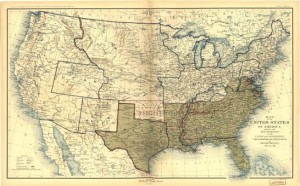 Soldiers are on the minds of home front Baptists North and South.
Soldiers are on the minds of home front Baptists North and South.
Today the Ladies Soldiers’ Aid Society of the First Baptist Church of Chicago, Illinois celebrates the organization’s second anniversary. The evening program includes hymns and a series of guest speakers.
While the ladies of the First Baptist Church of Chicago raise funds to assist Union soldiers, on the battle front of war Baptist-raised Union Sergeant George E. Stephens of the African-American 54th Massachusetts Regiment today describes what he sees near Union-occupied Jacksonville, Florida, far from his Northern home.
You can see nothing but pine woods, marsh, and every five or ten miles a cluster of dilapidated, deserted huts, with no sign of agricultural thriftiness. But immense tracts of this pine-woods land are prepared for the collection of pitch. The trees are tapped, and near the roots cavities are hewn out, into which the pitch collects.
Stephens, an abolitionist long before the war, is now the leading African American war correspondent, his writings chronicling the exploits of the groundbreaking 54th Massachusetts, one of the nation’s first African American army regiments. His letters, published in the weekly New York Anglo-African, chronicle the war against the Confederacy as well as the battle against racism within Union army ranks.
Meanwhile, Southern Baptist newspapers each week chronicle the ongoing revivals among Confederate soldiers, frequently publishing letters from army missionaries and chaplains who rejoice over the latest baptisms in army camps. Religious revivals, in effect, offer much more favorable news than tidings from the battle front, while prolonging hope that God might yet reach down his mighty hand and rescue a faltering Confederacy from the Northern enemy who is seizing more and more southern lands and freeing black slaves by the tens of thousands.
In today’s North Carolina Baptist Biblical Recorder, an editorial written by a Confederate army missionary ponders “the causes of the religious revivals in the army.”
One of the causes of the religious revival in the army may be owing in some sense to that desire for reading and topics of reflection which absence from home influences and the intermission of the usual labors of life beget in the soldier. Under such circumstances he will readily accept anything that promises to relieve the monotony.–Though he be a very worldly man, yet does he feel this want so much that he readily reads religious matter to escape from the dullness. So that many men there will read a religious book or tract, the Bible or a sermon, who would never have done such a thing at home. In my labors I have often seen the effect of this desire for anything to read and have even seen religious matter eagerly swallowed down and the happy fruits of seriousness and repentance very soon come forth.
Under the light of religion a fact has been observed now for the first time (I believe); that there is something in the stern duties of a soldier and in his perilous trials that stirs his heart to meet at once the solemn duties of religion. Hence, he, with a noble magnanimity of soul, at once rises up in moral courage to do his duty to God. What a proof of the power of religion thus to enable a man to bear the cross in the army (where the world says he can not be a christian,) who would not try to bear it at home. There is something too in the untold trials of the hospital, its lonely helplessness, to turn the suffering mind to search for that friend “that sticketh closer than a brother and for that balm in Gilead which forever heals the soul. Hence in a hospital I find that trials and sickness have usually gone before me introducing religious subjects to the soldier and I have but to direct, encourage and pray for the man, waiting at the pool.
While revivals within the Confederate Army perhaps garner more attention than those of their Northern enemies, in a war in which both sides’ armies are experiencing noticeable religious revivals among the soldiers, who’s armed forces are more righteous: The United States Army fighting on behalf of Christian-fostered abolitionism, or the Confederate States Army defending Christian-sanctioned black slavery?
Where is God? Whom will God have favored when the smoke clears from the killing fields?
Sources: “Second Anniversary. Ladies Soldiers’ Aid Society of the First Baptist Church. Sabbath Evening, March 6, 1864 Order of Exercises,” First Baptist Church, Chicago, Illinois (link); “George E. Stephens” (link); George Stephens and Donald Yacovone, A Voice of Thunder: A Black Soldier’s Civil War, University of Illinois Press, 1998 (link); Kelby Ouchley, Flora and Fauna of the Civil War: An Environmental Reference Guide, Louisiana State University Press, 2010, p. 87 (link); “News from the Army,” Biblical Recorder, March 6, 1864 (link)


